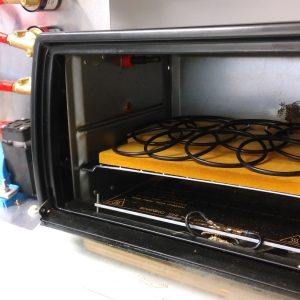Modelling Temperature Aging of Nitrile Rubber Rings With Step-Stress Accelerated Testing was conducted by Levin Lian for his MPE project. Accelerated life testing (ALT) is used to determine the reliability of products by subjecting them to higher levels of stress than anticipated during normal operation. However, for products with high durability and long life, ALT can be expensive. An alternative to traditional ALT is step-stress ALT. A step-stress test runs through a specified pattern of stresses, with each stress level held for an interval of time. Such testing has the potential to shorten the test cycle and reduce costs. This project develops a general model for predicting the life of nitrile rubber under temperature stress, by using data from a step-stress accelerated life test. Nitrile rubber is used as it is a widely-used, long life, high durability product. Two separate O-ring batches from the same manufacturer are thermally aged in a step stress fashion. Each batch is subjected to five progressively increasing temperature steps. 20% reduction in ultimate elongation is used as the failure criterion. Failure data is fitted to an Arrhenius-Weibull distribution using maximum likelihood estimation. From this, the probability of failure at different ages for different temperatures is determined. Results show that nitrile rubber has an increasing hazard rate. The characteristic life is 74.3 hours for batch 1 and 98.5 hours for batch 2 at 100°C. For shelf storage at a constant room temperature of 25°C, the models predict an average characteristic life of 7.2 years. Compared to traditional ALT methods in accelerated aging standards, the step-stress test program in this paper reduced testing time by at least 74%.


